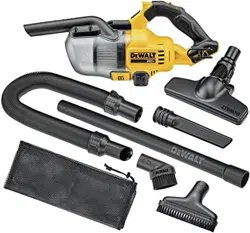Loading ...
Loading ...
Loading ...

ENGLISH
8
Installing Accessories (Fig.G)
NOTE: Ensure accessories are securely in place prior touse.
• Slide accessories onto the nozzle
10
.
• For longer reach, attach extension
11
or hose
12
to
thenozzle.
• Accessories may also be attached to the end of the hose
orextension.
Extension: Reach farther to clean
overhead, under objects, and
out‑of‑reachplaces.
Removing Dust Bowl (Fig.D)
1. Remove the dust bowl
2
by pressing the dust bowl
release button
3
and pulling the dust bowl down
andout.
Installing Dust Bowl (Fig. E)
NOTE: It is very important that the filter is correctly
positioned beforeuse.
1. Line up the rib
17
on the motor housing
18
with the
slot
19
of the dust bowl.
2. Install the dust bowl onto the unit and listen for an
audible click. Ensure the dust bowl is secured in place
beforeusing.
ASSEMBLY AND ADJUSTMENTS
WARNING: To reduce the risk of serious personal
injury, turn unit off and remove the battery pack
before making any adjustments or removing/
installing attachments or accessories. An
accidental start‑up can causeinjury.
Wall Mounting
Some DeWALT chargers are designed to be wall mountable
or to sit upright on a table or work surface. If wall mounting,
locate the charger within reach of an electrical outlet, and
away from a corner or other obstructions which may impede
air flow. Use the back of the charger as a template for the
location of the mounting screws on the wall. Mount the
charger securely using drywall screws (purchased separately)
at least 1” (25.4mm) long, with a screw head diameter of
0.28–0.35” (7–9mm), screwed into wood to an optimal
depth leaving approximately 7/32” (5.5 mm) of the screw
exposed. Align the slots on the back of the charger with the
exposed screws and fully engage them in theslots.
SAVE THESE INSTRUCTIONS FOR
FUTURE USE
will turn on automatically when the battery pack needs to
becooled.
Never operate the charger if the fan does not operate
properly or if ventilation slots are blocked. Do not permit
foreign objects to enter the interior of thecharger.
Electronic Protection System
Li‑Ion tools are designed with an Electronic Protection
System that will protect the battery pack against overloading,
overheating or deep discharge. The tool will automatically
turn off and the battery pack will need to berecharged.
Important Charging Notes
1. Longest life and best performance can be obtained if
the battery pack is charged when the air temperature
is between 65°F – 75°F (18° C– 24°C). DO NOT charge
when the battery pack is below +40°F (+4.5°C), or
above +104°F (+40°C). This is important and will
prevent serious damage to the batterypack.
2. The charger and battery pack may become warm to the
touch while charging. This is a normal condition, and
does not indicate a problem. To facilitate the cooling of
the battery pack after use, avoid placing the charger or
battery pack in a warm environment such as in a metal
shed or an uninsulatedtrailer.
3. If the battery pack does not charge properly:
a. Check operation of receptacle by plugging in a lamp
or other appliance;
b. Check to see if receptacle is connected to a light
switch which turns power off when you turn out
thelights;
c. If charging problems persist, take the tool, battery
pack and charger to your local servicecenter.
4. You may charge a partially used pack whenever you
desire with no adverse effect on the batterypack.
Charger Cleaning Instructions
WARNING:Shock hazard. Disconnectthe charger from
the AC outlet before cleaning. Dirt and grease may be
removed from the exterior of the charger using a cloth
or soft non‑metallic brush. Do not use water or any
cleaningsolutions.
Belt Hook (Fig.F)
WARNING: To reduce the risk of serious personal
injury, turn tool off and disconnect battery pack
before making any adjustments or removing/
installing attachments oraccessories.
WARNING: To reduce the risk of serious personal
injury, DO NOT suspend tool overhead or suspend
objects from the belt hook. ONLY hang tool’s belt hook
from a workbelt.
WARNING: To reduce the risk of serious personal
injury, ensure the screw holding the belt hook issecure.
IMPORTANT: When attaching or replacing the belt hook,
use only the belt hook screw
9
that is provided. Be sure to
securely tighten thescrew.
Installing Belt Hook
1. Insert the screw part way into the belt hook.
2. Slide the belt hook into place.
3. Fully tighten the screw. Ensure it is securely tighten.
4. To remove the belt hook, remove the screw and slide the
belt hook out.
NOTE: The belt hook
8
can be be attached to either side of
the tool using only the screw provided, to accommodate left‑
or right‑handed users. If the hook is not desired at all, it can
be removed from thetool.
Loading ...
Loading ...
Loading ...
